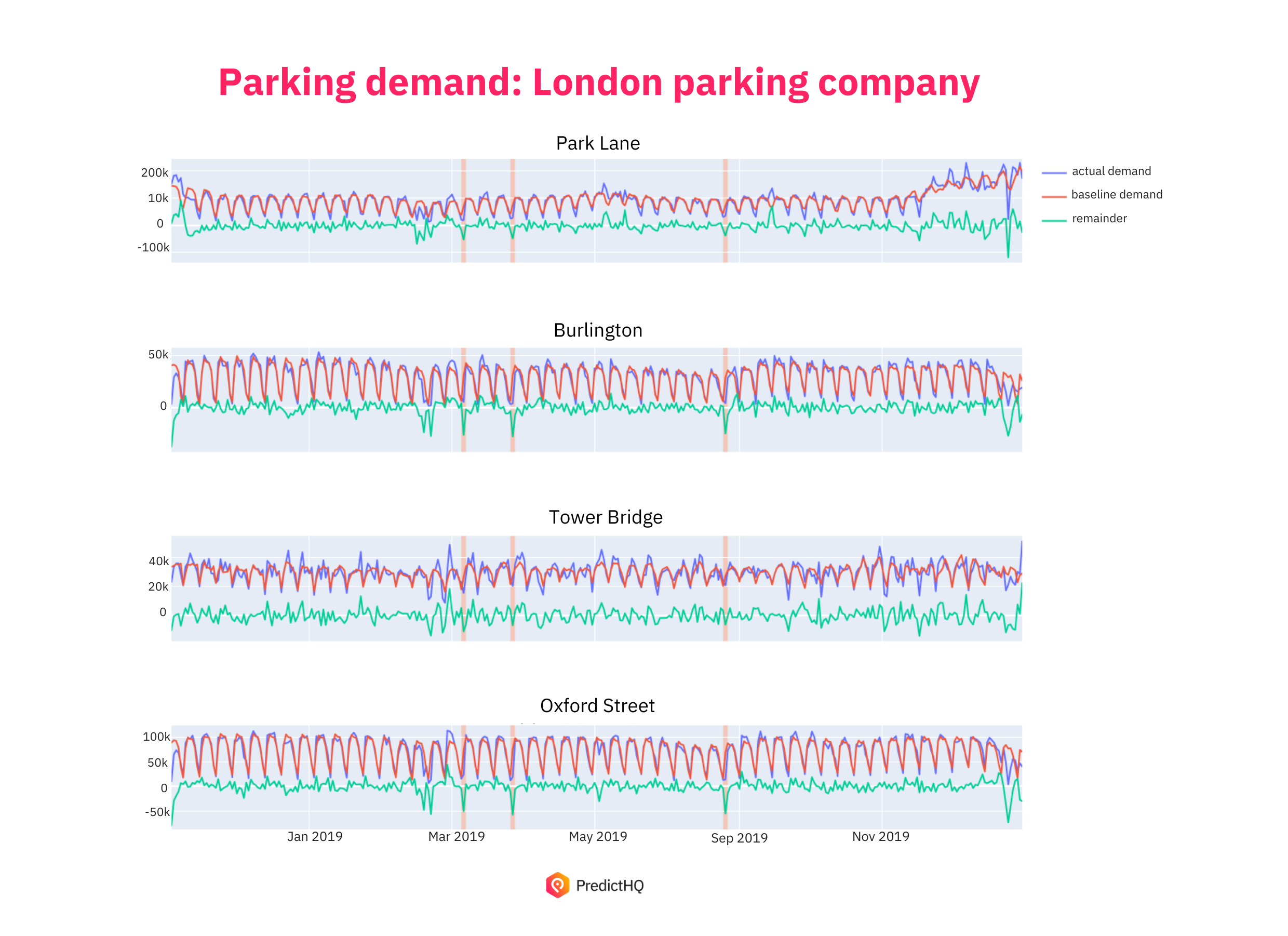How a cluster of public holidays caused an 80% drop in parking demand

Yes, it seems obvious, public holidays impact parking demand
Of course, when public holidays happen, people aren’t going into work or going about their normal routine. So shifts in demand are expected. But, the way these holidays impact parking demand can vary widely from one facility to another depending on location, the specific holiday, the type of parking operation, and more.
In some cases, demand for parking is higher on public holidays as people are more likely to be out and about. Whether people are running errands or simply out enjoying the day, the increased people movement in impacted locations means higher parking demand at places like malls, grocery stores, tourist attractions, and more.
On the other hand, some parking operators see lower demand on public holidays. As many companies close their doors on public holidays, less people are commuting to office buildings and other places where people typically park for work and other activities – which is exactly what happens to one of the largest parking facility operators in Europe when three bank holidays roll around.
Let’s take a look at how three public holidays plummet parking demand for a specific London parking operator, and how you can take these learnings to understand how your business may be able to leverage public holiday data to prepare for changes in demand in future.
London-based parking giant sees 80% drop in parking demand
The best way to find out how events such as public holidays will impact your parking demand is to find out how they’ve impacted your demand historically. In order to understand the catalyst behind sudden shifts in demand, one London parking operator turned to PredictHQ Beam – an automated correlation engine that accurately reveals the relationship between events and shifts in demand.
The operators within this specific business wanted to better understand how events impact their locations across the UK, so they ran their historical sales data through Beam for analysis. The results revealed that in May and August 2019, there was a sharp drop in demand across several of London facilities, with some locations seeing up to 80% below baseline:

In the graph above,
The blue line represents actual demand, which is the observed level of demand for a particular day.
The red line represents the baseline demand, or the usual level of demand these parking facilities would see under normal circumstances.
The green line represents the remainder, which is the demand outside what we expect from normal patterns and seasonality. This can be caused by events, and other factors such as promotional campaigns.
The three vertical orange bands highlights the three days where demand significantly decreased.
The Beam analysis revealed this significant shift in parking demand corresponded to three UK public holidays:
Early May bank holiday, which falls on the first Monday in May
Spring bank holiday, which falls on the last Monday in May
Summer bank holiday, which falls on the last Monday in August
These holidays tend to fall on different days each year, which can easily catch parking companies off guard if they’re not working with event data, or an updated event calendar. Leaders in the parking industry use event data to minimize loss by optimizing pricing, staffing, and marketing strategies at scale for each of their facilities – here are four ways you can do the same.
4 ways to minimize loss during demand dead times and zones
Confirming that these events drive parking demand down drastically helps to better plan for these holidays in the future. For example:
Reduce parking rates: As there are less people out and about, and less need for people to use your facilities, dropping the price on these days can make your offering more competitive.
Adjust operating hours: If a certain holiday or event has historically meant particularly low parking demand for your facilities, you can cut down on staffing and operational costs by adjusting opening hours to match incoming levels of demand.
Offer monthly passes: Help stabilize revenue during slow periods with options for monthly unlimited parking passes. For frequent visitors, a monthly pass offers cost savings compared to hourly or daily rates, plus the convenience of having a guaranteed parking space with a trusted facility.
Leverage event-based marketing: It’s tough to pass up on a great deal. Offer special coupons with discounted or free parking ahead of time to entice those who are considering going out on that holiday. For example, an email campaign that reads "May Day, May Day! Discounted Parking Ahead!", or “Bank on this: Free Parking for May Day!".
Find out how holidays and other categories of events have historically impacted your demand
The impact of public holidays on demand for parking can vary significantly – which is why it’s critical for operators to assess local parking demand in advance. Parking companies can prepare for fluctuating levels of demand by adjusting prices, staffing levels, and by ensuring they have sufficient capacity to meet the needs of their customers.
Beam securely combines and correlates PredictHQ’s intelligent event data with your transactional demand, so your data science team can prove correlations between your parking demand and certain types of events. Get your Beam analysis results in seconds, so you can start optimizing your demand planning today.






